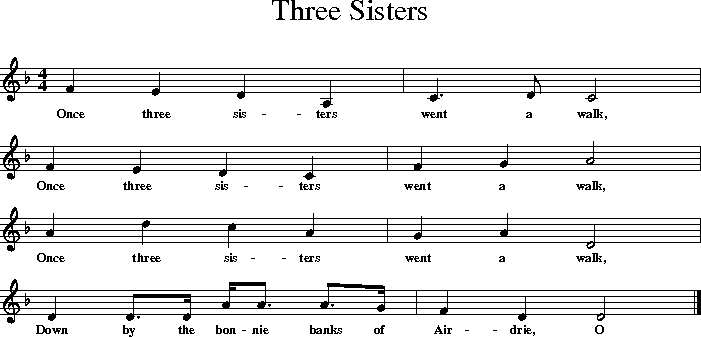Three Sisters- Briggs (Glasgow) 1942 Opie
[From Peter and Iona Opie, 1975, The Singing Game. An identical version was collected in 1910 (first verse only- see below) and appears courtesy of the Digital Tradition.]
Peter and Iona Opie's notes are as follows: This ballad, 'The Bonnie Banks o' Fordie', is, Professor Child says, "familiar to all branches of the Scandinavian race." At the beginning of the Second World War, Dr Katharine Briggs was taught a game-version by some children evacuated from Gallowgate of Glasgow; the words and tune were as above. "It was played as a rule grouped round one of the outside stairs. The chorus stood on the steps and four children acted it. The tune was clearly a folk-tune, and apparently of some antiquity. It is interesting to see how 'turned her round and made her stand' has become 'turned her round till she could not stand.' At this point the wicked brother spun the sister round and round under his hand till she fell to the ground." Later, she found that the game had also been well known in Edinburgh in the 1930s, in a version that began 'There were three sisters went to gather flowers.'
THREE SISTERS- Katharine Briggs from Gallowgate of Glasgow c. 1942 from Opie, P and I, 1975, The Singing Game, Oxford

Once three sisters went a walk,
Once three sisters went a walk,
Once three sisters went a walk,
Down by the bonnie banks of Airdrie, O
They met a robber on the way,
They met a robber on the way,
They met a robber on the way,
Down by the bonnie banks of Airdrie, O
He took the first one by the hand,
He birled her round till she could not stand,
He birled her round till she could not stand,
Down by the bonnie banks of Airdrie, O
Will you be a robber's wife,
Or will you die by my penknife?
Will you be a robber's wife?
Down by the bonnie banks of Airdrie, O
I'll not be a robber's wife,
I'd rather die by your penknife,
I'll not be a robber's wife,
Down by the bonnie banks of Airdrie, O
Then he took out his penknife,
Then he ended her sweet life,
Then he ended her sweet life,
Down by the bonnie banks of Airdrie, O
He took the second one by the hand,
He birled her round till she could not stand,
He birled her round till she could not stand,
Down by the bonnie banks of Airdrie, O
Will you be a robber's wife,
Or will you die by my penknife?
Will you be a robber's wife?
Down by the bonnie banks of Airdrie, O
I'll not be a robber's wife,
I'd rather die by your penknife,
I'll not be a robber's wife,
Down by the bonnie banks of Airdrie, O
Then he took out his penknife,
Then he ended her sweet life,
Then he ended her sweet life,
Down by the bonnie banks of Airdrie, O
He took the third one by the hand,
He birled her round till she could not stand,
He birled her round till she could not stand,
Down by the bonnie banks of Airdrie, O
Will you be a robber's wife,
Or will you die by my penknife?
Will you be a robber's wife?
Down by the bonnie banks of Airdrie, O
I'll not be a robber's wife,
I'd rather die by your penknife,
I'll not be a robber's wife,
Down by the bonnie banks of Airdrie, O
I wish my two brothers were here,
I wish my two brothers were here,
I wish my two brothers were here,
Down by the bonnie banks of Airdrie, O
What are your two brothers like,
What are your two brothers like,
What are your two brothers like?
Down by the bonnie banks of Airdrie, O
____________________
Three Sisters [from Mudcat DT]
Three sisters went to gather flow'rs,
Three sisters went to gather flow'rs,
Three sisters went to gather flow'rs,
Down by the bonnie banks o' Airdrie, O.
A. Reid, Rymour Club Misc. II (1910), 78, with tune. Sung by little girls at Kingarth, Bute. This is the opening of the ballad "Babylon, or The Bonnie Ba nks o' Fordie" (Child 14); on which see also Bronson, I.248; this tune, p. 251, is connected to the "Hind Horn" tradition (see ibid., 254 ff.).
Opies Singing Game
(1985),263, with tune (a variant of the Bute), from the Gallowgate in Glasgow, which accompanied a dramatic version of the ballad. The Opies compare Herd's incipit (Herd MS. I.38):
There wond three ladies in a bower,
Annet and Margret and Marjorie,
And they have gone out to pu' a flower,
And the dew it lyes on the wood, gay ladie.
Close is a Vermont version in Flanders & Olney, Ballads Migrant in New England (1953), 61-3, beginning
"There were three sisters picking flowers
High in the lea and the lonely O."